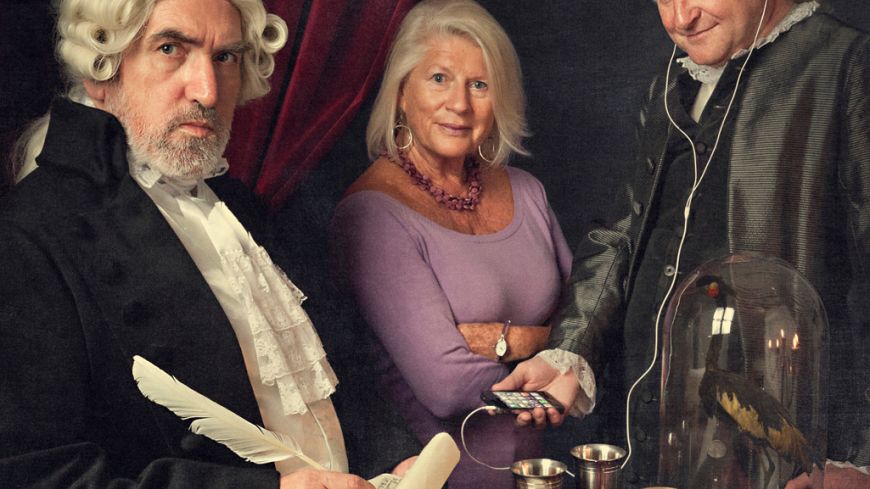
Tree of Knowledge is an attempt to bring its audience face to face with the contradictions of philosophy, or rather the contradictions of two philosophers – Adam Smith and David Hume. Some may claim Smith as an economist, but it’s very doubtful he saw himself as such, while Hume’s historical writing has been eclipsed by his philosophical studies. Such are the effects of time and taste.
As this review gets written, Scott Joplin’s minor masterpiece, The Entertainer, plays in the background. Elegant yet sportive, precise yet free-ranging, it feels (pace David Paul Jones excellent musical score for this play) the perfect musical comment on what Clifford appears to be attempting here. Which is actually as complex as a Joplin score, so that if the text seems to stumble at certain points, we still have to applaud the effort involved.
Presenting historical characters in essentially non-historical (or as here, ahistorical) settings remain both a challenge and a danger for dramatists. Provided with dialogue they neither wrote nor spoke, historical figures can become mouthpieces for the writer’s personal concerns or the purveyors of their propaganda. Theatre with a historical background is a difficult tightrope to walk and the danger of false steps an ever present one.
David Hume (Gerry Mulgrew) and Adam Smith (Neil McKinven) awake to discover themselves not dead but merely in an abeyance of time. They are soon joined by Eve (Joanna Tope), a near-contemporary ‘ordinary’ woman, and proceed to explore the contrasts between eighteenth century Edinburgh and its current version. Among larger debates references to the two philosophers’ works abound, but the context for both current comments and previous references continue to frustratingly shift throughout the play, while the arguments deployed by the characters are too often picked up only to be dropped when a more promising one was raised.
Although writers are at liberty to create completely ahistorical versions of ‘real’ persons and frequently do, there can be awkward instances of authorial intervention. Clifford’s Adam Smith is presented as a suitably oedipally obsessed case for Freudian analysis, whose rush from the closet in search of homosexual satisfaction helps make a subsequent point about the full implication of the phrase ‘human capital’ but feels both rushed and unconvincing. In the late George Byatt’s ‘Brus’, one character, when confronted by the eponymous hero-king, remarks ‘He’s no ma f***in king’.
Likewise, this was not this reviewer’s effing Smith, lacking both any attempt on the inter-related arguments which make the ‘Theory of Moral Sentiments’ and ‘Wealth of Nations’ not the products of youthful optimism and wiser old age, but a serious attempt to explain both our selfless and selfish selves, or any indication of the wide ranging knowledge of literature and drama which enriches his ‘Moral Sentiments’.
Drama, necessarily, is never fair or balanced, but it depends as deeply as philosophy or politics on the combat between differing positions. Although the arguments deployed here are presented with deftness and lightness of touch, the effect remains scattergun, flitting from spiritual to philosophical to economic without sufficient sure guidance. This reviewer was left with the sense of a score which still needed orchestration.
Runs til 24 December 2011

